Always the invincible hero, energetic and playful, Jackie Chan (
Recently, however, rumors have been circulating that he has contracted cancer, hence his reluctance to take comic roles in Hollywood movies. Chan talked frankly with the media on his visit to Taipei earlier this week.
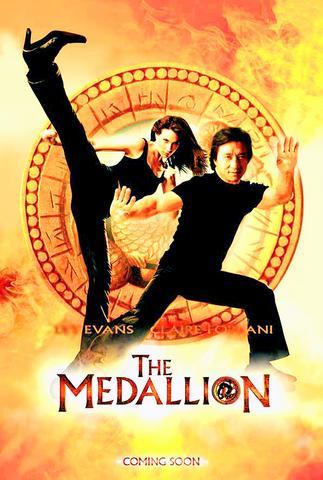
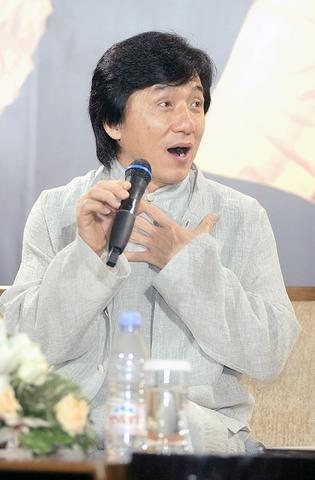
PHOTO: LEE KAI-MING, TAIPEI TIMES
Q: There was a rumor saying you had throat cancer? What happened?
Jackie Chan: Yesterday I went to NTU Hospital for a check-up. The doctor found a tubercule and I had a paracentesis test. The test result was negative. So I'm fine. I once again tell you that my health is OK, no problem. But to tell the truth, I was really scared doing the test. I grabbed the nurse's hand so hard because of fear. I guess I hurt her.
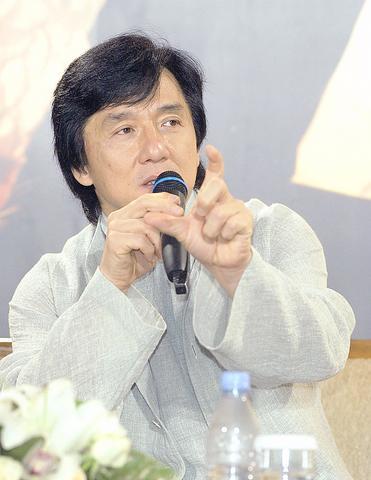
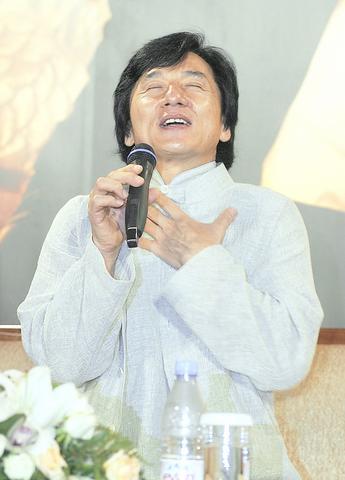
Q: How did it feel to kiss Claire Forlani in ?`The Medallion?' You rarely do such romantic scenes.
Chan: We are lovers in the film. So there was a kissing scene. When we shot that scene, I was just thinking whether it should be a long kiss or a quick one, should I open my mouth, but she [Forlani] just held my arms and gave me a French kiss. After the take, she was calm and natural but my face was all red. I'm really not good at romantic scenes. There was another scene when I was dead, lying naked in the morgue. Claire needed to cry over my body and touch me. But something was tickling me and I laughed. And we had to do that take again. It took us several times to do that take and I felt very embarrassed.
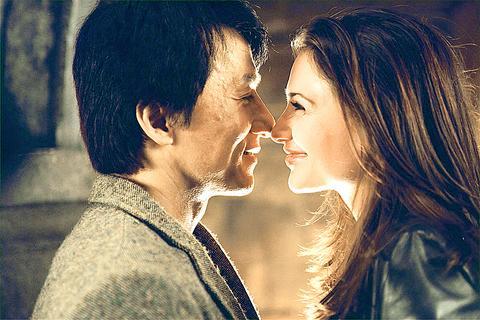
PHOTO COURTESY OF UIP
Q: The film took place in a castle in Dublin. Did you drink a lot of Guinness beer?
Chan: I had quite a few pints of Guinness. I'm not a good drinker but I act like it. When drinking, I have the word "brave" on my forehead and the word "dead" written on my back!
Q: After working in Hollywood all these years, how is your English now?
Chan: At the beginning it was very difficult. Now I'm doing fine. My English is Jackie Chan English. I may have some grammar mistakes. But if you understand it, good. If not, sorry!.
Q: The new film has adapted lots of special effects, which are seldom seen in Jackie Chan movies. Do you like them?
Chan: It's a very new experience for me. My films have been famous for real action. So for me, using wires to hang in the air was new to me. I basically just let the English stuntman direct me as to what to do. But once the steel wire on my chest broke. It hit my face and I just saw black before my eyes. When I touched my face, it was full of blood. It's lucky that my eyes were not hurt.
Q: What differences are there working in a Hollywood studio?
Chan: When you work there, you are the foreigner, so the whole process is hard. Our way of shooting is very fast and you feel they are so slow, that sometimes you think it's dumb. Making films in America you don't feel a sense of superiority, though, because they always try to control you. If you need to set up lighting equipment in a corner about 5m high, they will hire a man with an elevator to slowy lift this person to the point to set up the light. But if it's in Hong Kong, we just get a rope and climb up.
Hollywood is a very big market. The box office revenue in one day is higher than that for one year in Hong Kong. So you still want to take on new challenges there. You can learn a lot of things. I have been fighting to get into Hollywood. Twenty years ago my salary for a movie was HK$4.5 million (US$600,000) which was top among all Asian actors. But when I went to Hollywood for the first time, [making Cannonball Run II in 1984], I found out that my acting partner Burt Reynolds's salary was US$5 million. I realized that the world outside was very different. Who'd have thought that in 20 years my pay for a movie would become US$20 million plus bonuses? I've never thought I would have my hands printed in front of the Chinese Theater in Los Angeles. I think God has been very kind to me.
Q: If you die and were resurrected, as happens in your latest film, would you choose to be an actor again?
Chan: Yes, definitely. It's hard to imagine not doing films. Wherever I go, I'm always looking for shooting locations. Like this hotel I stayed in yesterday. I was looking outside, thinking if I could jump and enter this large window. And when I was in Amsterdam, I saw this building with an inclined angle, so I immediately told my producer to check this location for shooting. You know my films are about action in all those interesting locations. You have to make use of the environment in designing the action scenes.
Q: What are your next film projects?
Chan: I've finished shooting Around the World in 80 Days [with English comedian Steve Coogan]. I will be talking to Stanley Tong (
Q: The 40th Golden Horse Awards plans to invite previous winners to "come home" and join the ceremony, including you and your wife. Will you bring her back to Taiwan again?
Chan: I will come, but she won't. Nobody can persuade her. Ai-ya! She has stopped going to these kinds of events so you can stop asking me. There will be so many people, cameras and media. She would be scared. I don't think she would come -- unless there was an award for her.

A vaccine to fight dementia? It turns out there may already be one — shots that prevent painful shingles also appear to protect aging brains. A new study found shingles vaccination cut older adults’ risk of developing dementia over the next seven years by 20 percent. The research, published Wednesday in the journal Nature, is part of growing understanding about how many factors influence brain health as we age — and what we can do about it. “It’s a very robust finding,” said lead researcher Pascal Geldsetzer of Stanford University. And “women seem to benefit more,” important as they’re at higher risk of

March 31 to April 6 On May 13, 1950, National Taiwan University Hospital otolaryngologist Su You-peng (蘇友鵬) was summoned to the director’s office. He thought someone had complained about him practicing the violin at night, but when he entered the room, he knew something was terribly wrong. He saw several burly men who appeared to be government secret agents, and three other resident doctors: internist Hsu Chiang (許強), dermatologist Hu Pao-chen (胡寶珍) and ophthalmologist Hu Hsin-lin (胡鑫麟). They were handcuffed, herded onto two jeeps and taken to the Secrecy Bureau (保密局) for questioning. Su was still in his doctor’s robes at

Last week the Democratic Progressive Party (DPP) said that the budget cuts voted for by the China-aligned parties in the legislature, are intended to force the DPP to hike electricity rates. The public would then blame it for the rate hike. It’s fairly clear that the first part of that is correct. Slashing the budget of state-run Taiwan Power Co (Taipower, 台電) is a move intended to cause discontent with the DPP when electricity rates go up. Taipower’s debt, NT$422.9 billion (US$12.78 billion), is one of the numerous permanent crises created by the nation’s construction-industrial state and the developmentalist mentality it

Experts say that the devastating earthquake in Myanmar on Friday was likely the strongest to hit the country in decades, with disaster modeling suggesting thousands could be dead. Automatic assessments from the US Geological Survey (USGS) said the shallow 7.7-magnitude quake northwest of the central Myanmar city of Sagaing triggered a red alert for shaking-related fatalities and economic losses. “High casualties and extensive damage are probable and the disaster is likely widespread,” it said, locating the epicentre near the central Myanmar city of Mandalay, home to more than a million people. Myanmar’s ruling junta said on Saturday morning that the number killed had